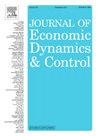推广启发式切换模型和一条远离随机性的(有界)理性路径
IF 2.3
3区 经济学
Q2 ECONOMICS
引用次数: 0
摘要
关于进化离散选择模型的行为经济学文献通常依赖于标准logit框架。然而,这种方法对其所代表的经济环境类型施加了重大限制,因为它不允许可观察到的偏好的异质性(随机口味变化),并假设不相关替代方案的独立性(IIA)。我们放宽了标准逻辑的假设,并解决了两个关键问题:(i)布洛克和霍姆斯(1997)(BH)的理论见解在多大程度上适用于更一般的经济环境?(ii)标准logit在捕捉相关实验结果方面的缺点能否通过使用更灵活的离散选择模型来解决?我们发现,一个基于概率的模型有意地放宽了IIA假设,与标准logit相比,它对具有四个选择选项的实验数据的拟合效果要好得多,特别是如果该模型还允许随机口味变化的话。此外,我们证明,虽然黑洞的关键见解在更广泛的环境中仍然有效,但允许口味变化可以提供一条远离黑洞中出现的混沌动力学的途径。本文章由计算机程序翻译,如有差异,请以英文原文为准。
Generalizing heuristic switching models and a (boundedly) rational route away from randomness
The behavioral economics literature on evolutionary discrete choice models typically relies on the standard logit framework. However, this approach imposes significant limitations on the types of economic environments it can represent as it, e.g., does not allow for heterogeneity in preferences regarding observables (random taste variation) and assumes independence of irrelevant alternatives (IIA). We relax the assumptions underlying standard logit and address two key questions: (i) to what extent do the theoretical insights of Brock and Hommes (1997) (BH) hold in more general economic settings? (ii) can the standard logit's shortcomings in capturing relevant experimental findings be resolved by using more flexible forms of discrete choice models? We find that a probit-based model that meaningfully relaxes the IIA assumption fits experimental data with four choice alternatives considerably better than standard logit, especially if the model additionally allows for random taste variation. Further, we demonstrate that while the key insights of BH remain valid in broader environments, allowing for taste variation can provide a route away from the chaotic dynamics emerging in BH.
求助全文
通过发布文献求助,成功后即可免费获取论文全文。
去求助
来源期刊

Journal of Economic Dynamics & Control
ECONOMICS-
CiteScore
3.10
自引率
10.50%
发文量
199
期刊介绍:
The journal provides an outlet for publication of research concerning all theoretical and empirical aspects of economic dynamics and control as well as the development and use of computational methods in economics and finance. Contributions regarding computational methods may include, but are not restricted to, artificial intelligence, databases, decision support systems, genetic algorithms, modelling languages, neural networks, numerical algorithms for optimization, control and equilibria, parallel computing and qualitative reasoning.
 求助内容:
求助内容: 应助结果提醒方式:
应助结果提醒方式:


